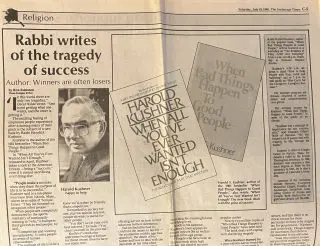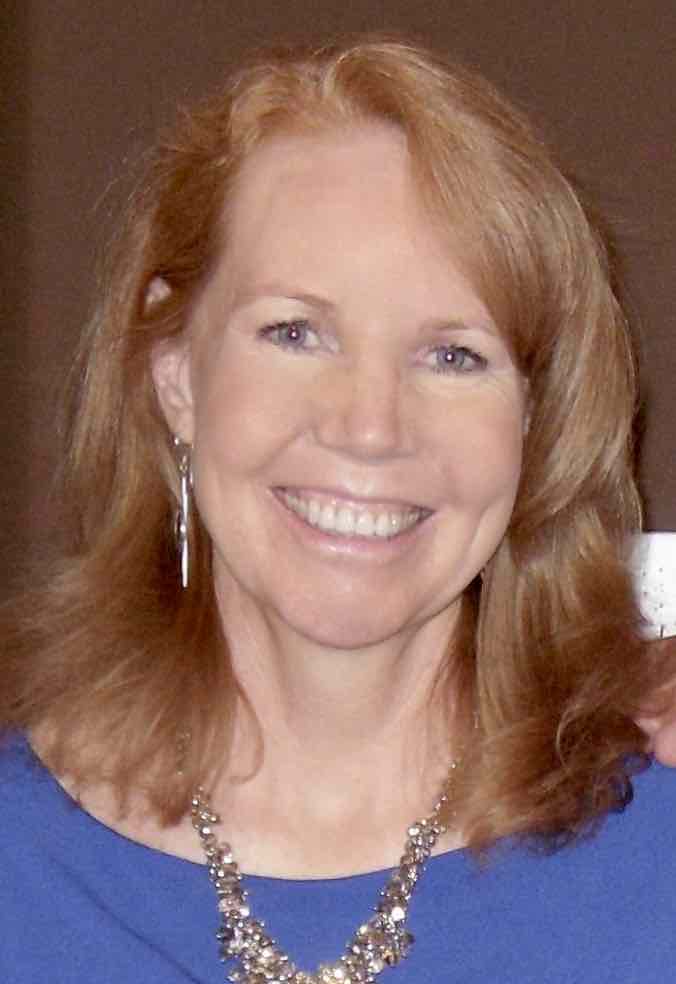My interview with Rabbi Harold Kushner, author of ‘When Bad Things Happen to Good People’
When I worked at The Anchorage Times during the 1980s, I was fortunate to get my dream job writing a consumer action column. However, along with the job as columnist, I also had to be the religion editor.
It meant that every week, I had to write a big feature article on religion along with compiling the Church Circuit, a listing of religious events in the anchorage area for that week.
In 1986, I interviewed Rabbi Harold Kushner, author of ‘When Bad Things Happen to Good People,’ about his new book “When All You’ve Ever Wanted Isn’t Enough.”
Kushner was coming to Anchorage to take in a workshop on “The Realities of Pain, Grief and Suffering” at Humana Hospital Anchorage.
Kushner died Friday at age 88.
Here’s my article from the Saturday, July 19, 1986, issue of The Anchorage Times:
“In this world there are only two tragedies,” Oscar Wilde wrote. “One is not getting what one wants, and the other is getting it.”
The puzzling feeling of emptiness people experience after attaining many of their goals is the subject of a new book by Rabbi Harold S. Kushner.
Kushner is the author of the 1981 bestseller “When Bad Things Happen to Good People.”
In “When All You’ve Ever Wanted Isn’t Enough,” released in April, Kushner takes a look at the American Dream – being a “success,” even if it means sacrificing everything else.
“People make a mistake when they think the purpose of life is to be successful,” Kushner said in a telephone interview from Natick, Mass., where he is rabbi of Temple Israel. “They set themselves up against other people.”
When people are completely dominated by the sports mentality of continually wanting to “win,” it hampers their Growth as real people, he said.
“Competition and winning are unhealthy. It costs people in terms of human Relationships.”
The purpose of life is to be a real human being, Kushner said, and people need to adopt the philosophy, “When I win nobody has to lose.”
Deeply rooted economic forces keep people in ruts that make them very good at one thing.
“We’re like hunting dogs who have been trained to bring back the game birds in their mouths without taking a bite out of them,” Kushner said. “We deny our own healthy instincts. At some level, we know we’d rather be friendly than competitive.”
Rewarded by society for one, narrow special interest, people do what is useful for other people.
“You don’t act in your own best interest,” he said. “You cheat yourself in the process.”
Kushner’s book also addresses feelings of failure for those who dreams have not come true.
“I say to them, ‘If you’ve been a good and faithful husband or wife, a caring and responsible parent, and a good friend, that’s being a success even if you don’t make a whole lot of Money.”
The lifestyles of the good and humble should be the role model, not that of the rich and famous, he said.
Turning 50 years old as he was writing the book, Kushner began by trying to write about other people’s problems and offering advice on how to find solutions to their dilemmas.
But he found he had to confront the issues in his life – the realization middle age was upon him, the death of his father and how to deal with the demands on his time after becoming a famous author – so he turned his pen to the topic of living a life that matters instead.
“When I realized I was not going to be around forever, I began to worry about what life added up to,” he said.
“Although I did not fear dying, I had to look at the fear that I really had not lived.”
Kushner’s soul searching about life spawned a book which helps people who are searching for meaningful and satisfying lives.
Much to his surprise, Kushner’s book appeals to people in their 30s as well as people in his age group.
“People who have been on the fast track since high school, get tired of success costing, too,” he said.
Taking his own advice about getting what you want out of life, Kushner works half-time as a rabbi, which allows time for writing and Travel.
Years of writing as a student and developing sermons provided Kushner’s early writing experience. But it was the burning desire to share messages with others that has led to his becoming a popular author.
Nearly two million copies of “When Bad Things Happen to Good People” have been sold.
The book deals with coping with shattering tragedy.
When Kushner learned his 3-year-old son Aaron would die in his teen-age years from a rare disease, he began to confront the question: Why do bad things happen to innocent people? He decided to write a book about God’s role in personal tragedies.
His conclusions? God does not punish people with death, illness, injury, rejection and disappointment because they have been bad.
“I believe that these calamities are all acts of nature, and that there is no moral reason for those particular victims to be singled out for punishment,” Kushner said in the book. Things happen for no reason, that there is randomness in the universe.
“God, who neither causes nor prevents tragedies, helps by inspiring people to help,” according to Kushner. And, he is as outraged as we are about tragedies, the rabbi added.
How inspiring to remember this interview and being able to talk with Kushner and other well-known people such as Elizabeth Kubler-Ross. I learned a lot on the religion beat and am enjoying reading my articles as I prepare to send them to the archives at Washington State University, where I received my first of four college degrees.
Originally Published on https://boomersurvive-thriveguide.typepad.com/the_survive_and_thrive_bo/

























